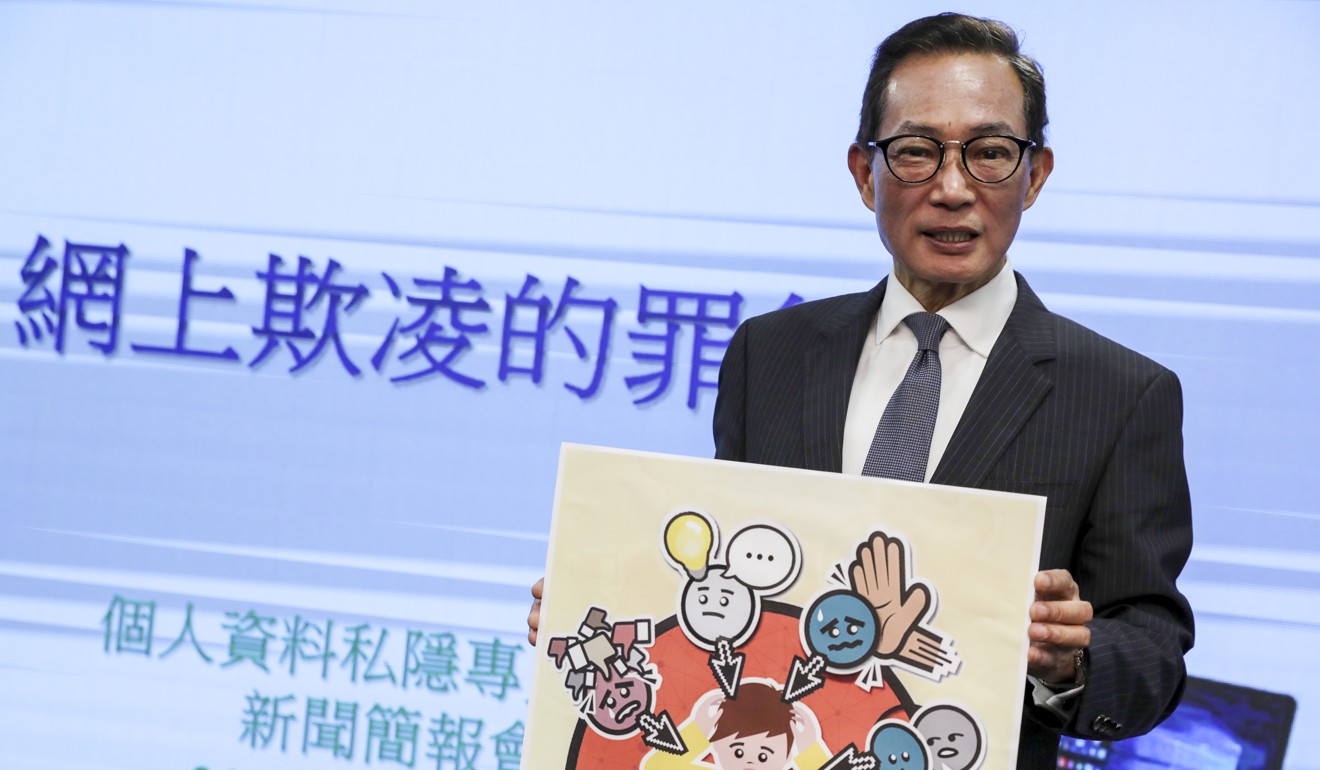
Hong Kong privacy watchdog to investigate police officer who showed journalist’s personal data to thousands during protest
- Officer showed the reporter’s Hong Kong ID card to camera during an altercation at a Tai Po mall
- Privacy commissioner Stephen Wong says his office will launch ‘proactive investigation’
Hong Kong’s privacy watchdog is to investigate a police officer for displaying a reporter’s identification card in front of a live-streaming camera during a protest on Thursday.
Speaking on Friday morning, the Privacy Commissioner for Personal Data, Stephen Wong Kai-yi, said his office had not yet received a complaint, but would “launch a proactive investigation” after what he called “prima facie evidence” the law had been broken.
If the subsequent investigation uncovered a breach, Wong said his office would issue an enforcement notice requesting remedial actions to the relevant institution or person, and prosecute if the notice was ignored.
Wong was responding after two journalists’ groups in the city condemned the officer’s actions and claimed they had effectively doxxed Stand News reporter Ronson Chan.
Chan’s ID card was made visible to some 10,000 online viewers for about 40 seconds during an interaction with police, and he said he planned to file complaints with the watchdog, and the police force.

The Hong Kong Journalists Association (HKJA) and the Hong Kong Press Photographers Association said in a joint statement on Thursday that the officer had deliberately shown the reporter’s ID card on camera.
“To make the reporter’s personal information public … is no different from doxxing,” they said.
Speaking earlier on Friday, former Independent Police Complaints Council member Edwin Cheng Shing-lung said although he thought the case was an isolated incident, the officer involved was “clearly wrong”.
Wong also called for police to be given clearer guidelines, and training, on how to handle private information.
After Christmas chaos, Hong Kong protesters plan major New Year’s Day rally
In an earlier written reply to the Post, Wong had said he was aware of the media reports surrounding the case, and added “there are justifiable grounds to initiate an investigation”.
Earlier this week the watchdog confirmed that five people had been arrested in four cases since June on suspicion of breaking data laws, including an earlier case where a man was charged with “conspiracy to disclose personal data obtained without consent from data users”.
Thursday’s incident happened inside a shopping centre in Tai Po, which police had entered to clear a group of black-clad protesters.
Chan, who was live-streaming the operation with a camera, asked if some masked men armed with batons were policemen.
“These officers wore no warrant cards and you cannot tell who they are,” Chan was heard saying in a video published by Stand News.
One of the masked men then responded: “There is no identification, so I’m not police.”
Chan was then taken aside by other officers and asked to present his press cards and Hong Kong ID card.
During the check, another masked officer held Chan’s ID card in front of his camera, which was still live-streaming. Chan’s name, ID card number and date of birth were visible.
After I pointed the camera toward him, he placed my ID card front and centre before the camera
Chan said the officer could have violated the city’s privacy laws, but the officer blamed the reporter for keeping the camera rolling.
Speaking after the incident, Chan alleged that it was the officer in question who told him to film the inspection.
“After I pointed the camera toward him, he placed my ID card front and centre before the camera,” Chan said.
The reporter, who is an executive committee member at the HKJA, said he planned to make formal reports to the Complaints Against Police Office and the Office of the Privacy Commissioner for Personal Data (PCPD).
Stand News editor-in-chief Chung Pui-keun said the outlet would help Chan make the complaints and that the police would be asked to provide the name and identification number of the officer in question.
Student arrested for possessing explosives denied bail
Veteran lawyer Dominic Wai, who advises on privacy law, said the officer could have broken privacy laws.
“On the face of it, there’s no need for the officer to display the HKID in front of the camera for that period,” he said.
In a reply to the media, the force said it respects freedom of the press, but did not touch on the details of Chan’s case.
“The police must urge reporters to consider their personal safety when reporting,” it said.
In the past, the HKJA has accused police of harassing and physically attacking reporters doing their jobs. Police in turn have accused journalists of obstruction during anti-riot operations and siding with protesters.
Additional reporting by Alvin Lum

